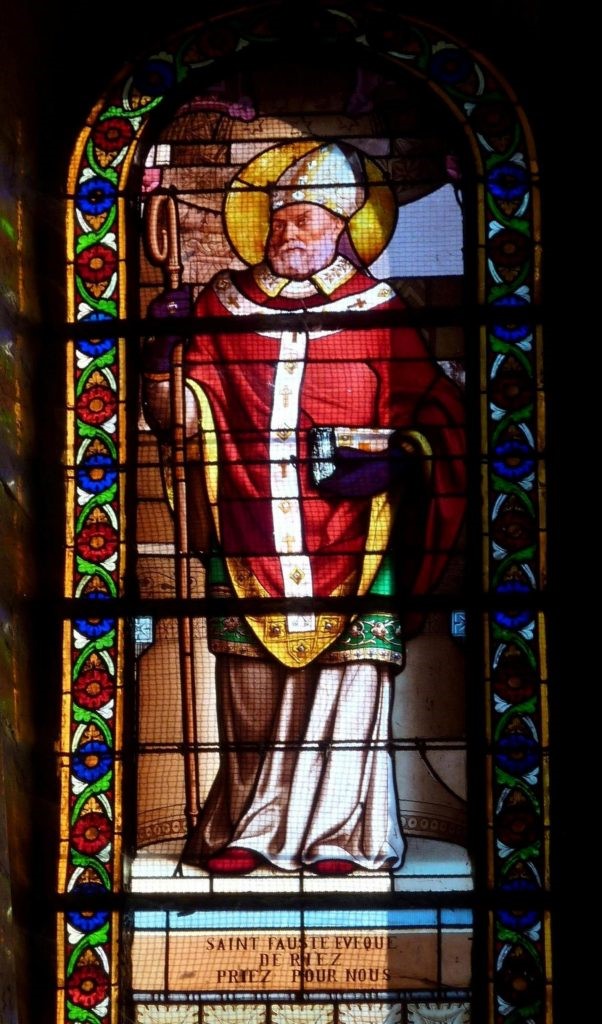– Anastasios
Here we are dealing with another great character representing of monastic life in the 5th century. He was from Britain. Was probably a lawyer but at a young age he felt the need to retire in a Monastery, and so he started his monastic life in the famous Monastery of Lérins, in France. He was made Bishop of Riez and for his defense of Catholic orthodoxy was also sent in exile from the Visigoths King, Henry (exile that will last from 477 to 486).
“Throughout his life Faustus was an uncompromising adversary of Pelagius, whom he styled Pestifer, and equally decided in his opposition to the doctrine of Predestination which he styled “erroneous, blasphemous, heathen, fatalistic, and conducive to immorality.” This doctrine in its most repulsive form had been expounded by a presbyter named Lucidus and was condemned by two synods, Arles and Lyons (475). At the request of the bishops who composed these synods, and especially Leontius of Arles, Faustus wrote a work, Libri duo de Gratiâ Dei et humanae mentis libero arbitrio, in which he refuted not only the doctrines of the Predestinarians but also those of Pelagius (PL, LVIII, 783). The work was marred, however, by its decided Semipelagianism, for several years was bitterly attacked, and was condemned by the Synod of Orange in 529 (Denzinger, Enchiridion, Freiburg, 1908, no. 174 sqq. – old no. 144; P.L., XLV, 1785; Mansi, VIII, 712). Besides this error, Faustus maintained that the human soul is in a certain sense corporeal, God alone being a pure spirit. The opposition to Faustus was not fully developed in his lifetime and he died with a well-merited reputation for sanctity. His own flock considered him a saint and erected a basilica in his honour. Faustus wrote also: Libri duo de Spiritu Sancto (P.L., LXII, 9), wrongly ascribed to the Roman deacon Paschasius. His Libellus parvus adversus Arianos et Macedonianos, mentioned by Genadius, seems to have perished. His correspondence (epistulae) and sermons are best found in the new and excellent edition of the works of Faustus by Engelbrecht, Fausti Reiensis praeter sermones pseudo-Eusebianos opera. Accedunt Ruricii Epistulae In The Catholic Encyclopedia. New York: Robert Appleton Company: http://www.newadvent.org/cathen/06019b.htm).
On a Sermon for the Epiphany, talking about the wedding feast at Cana, Faustus has said: “On the third day there was a wedding. What wedding can this be but the joyful marriage of man’s salvation, a marriage celebrated by confessing the Trinity or by faith in the resurrection. That is why the marriage took place ‘on the third day,’ a reference to the sacred mysteries which this number symbolizes. Hence, too, we read elsewhere in the Gospel that the return of the younger son, that is, the conversion of the pagans, is marked by song and music and wedding garments. Like a bridegroom coming from his marriage chamber our God descended to earth in his incarnation, in order to be united to his Church which was to be formed of the pagan nations. To her he gave a pledge and a dowry: a pledge when God was united to man; a dowry when he was sacrificed for man’s salvation. The pledge is our present redemption; the dowry, eternal life. To those who see only with the outward eye, all these events at Cana are strange and wonderful; to those who understand, they are also signs. For, if we look closely, the very water tells us of our rebirth in baptism. One thing is turned into another from within, and in a hidden way a lesser creature is changed into a greater. All this points to the hidden reality of our second birth. There water was suddenly changed; later it will cause a change in man. By Christ’s action in Galilee, then, wine is made, that is, the law withdraws and grace takes its place; the shadows fade and truth becomes present; fleshly realities are coupled with spiritual, and the old covenant with its outward discipline is transformed into the new. For, as the Apostle says: The old order has passed away; now all is new! The water in the jars is not less than it was before, but now begins to be what it had not been; so too the law is not destroyed by Christ’s coming, but is made better than it was.”
Saint Faustus’ liturgical fest is on September 28.


 Follow
Follow


